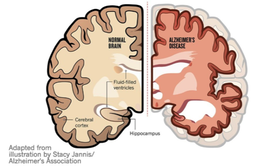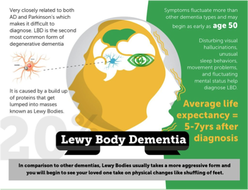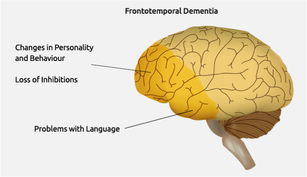|
What is Dementia? (By Dementia NZ 2017) Dementia is a progressive disorder where there is a decline in a variety of mental functions. The declining functions are primarily cognitive, that is, the person has a change in thinking abilities. The word dementia is a term which covers a group of disorders of cognition. Different types of dementia have different underlying disease processes and usually present with a different pattern of cognitive symptoms. However, all forms of dementia are associated with a decline in the ability to function day to day, emotional distress or behaviour changes. This will discuss:
 Types of Dementia Alzheimers Disease This is the most common form of dementia. It usually begins with a decline in memory and the ability to learn new things. Later, in the course of a steady, gradual deterioration, there are problems in other areas (for example speech, planning or reasoning, recognising objects, changes in emotions and behaviour). The cause of Alzheimers Disease is unknown though old age and certain genes appear to make people more prone to it. In the brain, there are microscopic changes, “plaques” of a substance known as amyloid and “tangles” within dying nerve cells. Vascular dementia: This occurs when there is insufficient blood supply to the brain. The symptoms are variable depending on which part of the brain is affected, though changes in the ability to pay attention, slowing of thought and frontal-lobe changes (see below) are common. The progression may be steady if the blood supply is gradually reduced by the narrowing of small arteries. Alternatively sudden or, “stepwise” progression occurs if the blood supply suddenly closes off to an area of the brain, often because a blood clot has formed or been carried from another location. The diagnosis is made from the history and evidence of blood vessel damage e.g. previous stroke seen on a brain scan or heart attack. It is quite common especially in the very elderly to have “mixed dementia”, that is, both Alzheimers and vascular changes.  Lewy Body Dementia (LBD): This condition is the third commonest cause of dementia, perhaps 20% of dementia cases. LBD is on a spectrum that includes Parkinson’s disease and the dementia associated with that condition. People with LBD have symptoms similar to those of Parkinson’s disease, such as stiffness, shaking and changes in gait. Cognitive changes include poor attention, changing levels of alertness and visual hallucinations (that is, seeing things that are not there). Sometimes those with LBD fall, faint or thrash about in their sleep as if acting out their dreams. Memory is typically not too impaired early on, but as the condition progresses all aspects of thinking are more widely affected. It is important to make the diagnosis to distinguish it from delirium, a potentially treatable medical condition, and to ensure the person is not given antipsychotic medication which can have severe side-effects in LBD. In this condition we see large spherical protein deposits in the brain – these are Lewy Bodies. The cause is unknown.  Frontotemporal dementia: In this group of conditions the frontal and /or temporal lobes of the brain are affected. Memory loss and learning problems are less obvious early on and the main symptoms are changes in behaviour and / or personality and / or language. The sorts of behavioural changes seen are: disinhibition (e.g. unrestrained or antisocial speech or behaviour), apathy (not initiating or doing anything), loss of empathy (understanding of others thoughts or feelings) repeated behaviours or rituals, changes in eating and loss of ability to plan or make judgements. Language changes include slow or hesitant speech, word-finding, naming, grammar and word comprehension. Frontotemporal dementia is a common cause of early onset dementia (beginning before the age of 65) and about 40% of people with frontotemporal dementia have a family history, suggesting there is a genetic cause. Who gets dementia? The likelihood of getting dementia increases as a person ages. This doesn’t however, mean that younger people – people aged less than 65 – don’t also get dementia. Some people may be predisposed to dementia by pre-existing intellectual disability, head injury or family history. Dementia is very common and as our population ages it is likely that everyone will have contact with someone with dementia. So the answer to “who gets dementia?” is really, “Anyone, though it is much more likely in older people”. How do you recognise dementia and get assistance? The important thing to note is that a person developing dementia has a change in how they function. For example, if someone has always had trouble reading maps or finding their way around and still can’t do this, there is no cause for alarm. On the other hand, if someone normally good at navigating, starts getting lost, you might worry. Sometimes the change is subtle: the usually reliable person is not paying the bills or the meticulous dresser goes out with stains on her clothing. This might not mean dementia. Other conditions like depression or physical illness can cause these changes, hence it is important to get to the doctor and / or encourage someone with alterations in their thinking ability, behaviour or emotions to attend the GP. In New Zealand the GP has access to a “cognitive impairment pathway” which is a series of steps and tests to go through to rule out other problems and decide whether this is dementia. Sometimes it is hard to tell and the person might be referred to a specialist (usually based in a hospital) or a memory clinic. Treatment
While there are no cures, yet, for any of the common forms of dementia, there is a lot that can be done to help and possibly slow the progression of symptoms. There is evidence that if people get an early diagnosis and thus know what is happening, they and their family / whanau cope better in the long term. Knowing what to expect also allows people to plan for the future. If you require some help managing a family member with dementia our friendly therpaists ca help. Just contact: Therapy Professionals Ltd Phone: 03 377 5280 Email: [email protected] Reference: Dementia NZ https://dementia.nz/wpcontent/uploads/2020/02/about_dementia_1_what_is_dementia_nz.pdf Comments are closed.
|
AuthorShonagh O'Hagan Archives
July 2024
|

 RSS Feed
RSS Feed